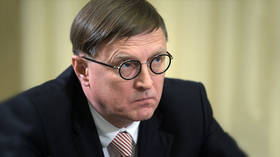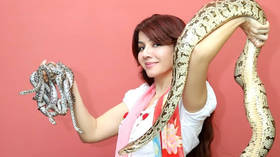Top judge says Russia shouldn't be considered successor of 'repressive, terrorist, illegal' Soviet Union, Kremlin disagrees

If you want to find a way to split Russian public opinion, there's no better instrument than a debate on the country's Soviet legacy. On Monday, sparks flew after a leading judge opened Moscow's most divisive Pandora's Box.
Konstantin Aranovsky believes the USSR was an "illegally created state" and says today's Russia shouldn't be considered its successor, rather its replacement. The Constitutional Court judge also lashed the "repressive-terrorist acts" of the Soviet era, and suggested Russia should have the status of a country "innocent of totalitarian crimes," since "it was recreated in spite of the regime and to replace it."
The Kremlin dismissed Aranovsky's claims, with Vladimir Putin's spokesman explaining that Russia is both de jure and de facto the legal successor of the Soviet Union. Dmitry Peskov said it was simply the opinion of one judge.
Aranovsky's comments were inspired by a verdict last December on compensation for housing taken from citizens by the Soviets. As Moscow daily Kommersant reported, three claimants born in deportation or special settlements sought housing in Moscow, where their families lived before Stalin-era repressions. The court found in their favor.
The judge, who agreed with the decision, believes Russia is wrong, however, to leave itself open to legal responsibility for the actions of the Soviet regime. Instead venturing that Moscow should compensate out of mercy and humanity but not as the heir to "the culprit state," saying it's impossible "to transfer guilt, especially so immeasurable and unforgivable, from one subject to another [separate entity]."
He further claimed that Russia can't be held accountable for the fallout of "failed socialism," insisting the Soviets bear "immense guilt" for various unforgivable atrocities, "beginning with the overthrow of the legitimate authorities [of Russia in 1917]."
Mikhail Emelyanov, the first deputy chairman of Russia's parliamentary committee on state-building and legislation, also poured cold water on Aranovsky's remarks. "[It's] a very strange statement from a person who occupies a quite serious position in the system of state power," he noted.
Also on rt.com 'Insulting our grandparents’: Putin’s spokesman blasts Zelensky for insinuating USSR started World War II"Succession does not concern the succession of the political regime, it concerns completely different things. And to mix the succession and the political regime is completely unacceptable."
As an example, Emelyanov pointed to the historical experience of France, where political systems also alternated, but it's never said that the French Republic isn't the successor to the old French monarchy.
The press service of the Constitutional Court pointed out that Aranovsky is only one of its 19 members. "The dissenting opinion of a judge of the Constitutional Court is his personal opinion, which is different from that of most of the judges," it noted in a statement.
Nobody from Moscow, or St. Petersburg, ever ruled the Soviet Union. Its longest-serving leaders were Josef Stalin (Gori, Georgia), Leonid Brezhnev (Dnepropetrovsk, Ukraine) and Nikita Khruschev (Donbass, Ukraine). A key reason why Boris Yeltsin's nascent 1990s Russian government agreed to take on the mantle of the successor state to the USSR, and honor its debts, was to retain membership of various international institutions and control of external Soviet assets – for instance, the permanent seat on the United Nations Security Council and embassies abroad.
Think your friends would be interested? Share this story!














